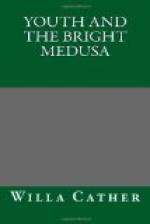When the nurse returned and we rose to go, Bouchalka still lay with his cheek on her cloak, and Cressida left it. “It seems to please him,” she murmured as we went down the stairs. “I can go home without a wrap. It’s not far.” I had, of course, to give her my furs, as I was not singing Donna Anna tomorrow evening and she was.
After this I was not surprised by any devout attitude in which I happened to find the Bohemian when I entered Cressida’s music-room unannounced, or by any radiance on her face when she rose from the window-seat in the alcove and came down the room to greet me.
Bouchalka was, of course, very often at the Opera now. On almost any night when Cressida sang, one could see his narrow black head—high above the temples and rather constrained behind the ears—peering from some part of the house. I used to wonder what he thought of Cressida as an artist, but probably he did not think seriously at all. A great voice, a handsome woman, a great prestige, all added together made a “great artist,” the common synonym for success. Her success, and the material evidences of it, quite blinded him. I could never draw from him anything adequate about Anna Straka, Cressida’s Slavic rival, and this perhaps meant that he considered comparison disloyal. All the while that Cressida was singing reliably, and satisfying the management, Straka was singing uncertainly and making history. Her voice was primarily defective, and her immediate vocal method was bad. Cressida was always living up to her contract, delivering the whole order in good condition; while the Slav was sometimes almost voiceless, sometimes inspired. She put you off with a hope, a promise, time after time. But she was quite as likely to put you off with a revelation,—with an interpretation that was inimitable, unrepeatable.
Bouchalka was not a reflective person. He had his own idea of what a great prima donna should be like, and he took it for granted that Mme. Garnet corresponded to his conception. The curious thing was that he managed to impress his idea upon Cressida herself. She began to see herself as he saw her, to try to be like the notion of her that he carried somewhere in that pointed head of his. She was exalted quite beyond herself. Things that had been chilled under the grind came to life in her that winter, with the breath of Bouchalka’s adoration. Then, if ever in her life, she heard the bird sing on the branch outside her window; and she wished she were younger, lovelier, freer. She wished there were no Poppas, no Horace, no Garnets. She longed to be only the bewitching creature Bouchalka imagined her.
One April day when we were driving in the Park, Cressida, superb in a green-and-primrose costume hurried over from Paris, turned to me smiling and said: “Do you know, this is the first spring I haven’t dreaded. It’s the first one I’ve ever really had. Perhaps people never have more than one, whether it comes early or late.” She told me that she was overwhelmingly in love.




